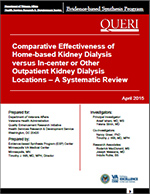
Principal Investigator:
Areef Ishani, MD, MS;
Yelena Slinin, MD
Co-Investigators:
Nancy Greer, PhD;
Timothy J. Wilt, MD, MPH
Download PDF: Complete Report, Executive Summary, Report, Appendices
Home-based dialysis (defined for this review as in-home hemodialysis [HHD] or peritoneal dialysis [PD] outside of a dialysis facility) may offer advantages over in-center hemodialysis (HD), including patient convenience, expanded capacity for VA to deliver fully integrated care to Veterans with end-stage renal disease (ESRD), a reduction in fee-basis costs associated with dialysis, and potentially improved patient quality of life and blood pressure control with greater survival and fewer hospitalizations. As the number of patients requiring renal replacement therapy (RRT) increases, there is need for a current review of the benefits and harms of home-based dialysis (HHD or PD) versus in-center HD, the benefits and harms of different home-based dialysis modalities, and the predictors of successful home-based dialysis to allow VA to better serve patient needs. We reviewed the evidence from studies of adults with chronic kidney disease requiring dialysis and comparing home-based and in-center HD. Due to between-country differences in health care systems, we focused our review on studies most relevant to the VA, ie, those from North America, Europe, or Australia/New Zealand.
We addressed the following key questions:
Key Question 1. What are the benefits and harms (ie, all-cause mortality, cardiovascular events, hospitalizations, depression, cognitive impairment, quality of life, conversion to a different type of dialysis, complications related to vascular access, complications of dialysis) of in-home compared to in-center hemodialysis?
1a. What are the benefits and harms (ie, all-cause mortality, cardiovascular events, hospitalizations, depression, cognitive impairment, quality of life, conversion to a different type of dialysis, complications related to vascular access, complications of dialysis) of the various modalities of in-home hemodialysis (ie, short daily, nocturnal) compared to conventional hemodialysis?
Key Question 2. What are the benefits and harms (ie, all-cause mortality, cardiovascular events, hospitalizations, depression, cognitive impairment, quality of life, conversion to a different type of dialysis, complications related to vascular access, complications of dialysis) of peritoneal dialysis compared to in-home hemodialysis or in-center hemodialysis?
2a. Do results differ depending on whether peritoneal dialysis was the initial therapy or the therapy used following failed in-center dialysis?
Key Question 3. What are the a) health care system, b) provider, and c) patient factors associated with selection of and technique survival for home-based dialysis (including peritoneal dialysis)?
Key Question 4. In the published literature, what are the costs of home hemodialysis or peritoneal dialysis compared to in-center hemodialysis?
Comparative Effectiveness of Home-based Kidney Dialysis versus In-center or Other Outpatient Kidney Dialysis Locations: A Systematic Review (Management eBrief)